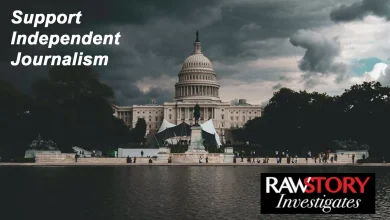Ticketmaster To Shut Down TradeDesk, Ban Multiple Accounts As It Refutes FTC Allegations

In this photo illustration a laptop displays the Ticketmaster website on September 8, 2024.
(Photo by Matt Cardy/Getty Images)
Ticketmaster will implement a raft of new policies — including shutting down its TradeDesk ticket inventory system and banning the use of multiple accounts — while continuing to refute allegations by the Federal Trade Commission that it violated the BOTS Act.
In an Oct. 17 letter to Sens. Marsha Blackburn (R-TN) and Ben Ray Luján (D-NM), Dan Wall — Live Nation’s Executive Vice President of Corporate and Regulatory Affairs — wrote that the FTC’s September suit against Live Nation and Ticketmaster for “illegal ticket resale” tactics and BOTS Act violations “presents a distorted view of the facts and the law.”
“At its core, the BOTS Act targets three things a scalper might do: it might circumvent our controls itself, it might get someone else to circumvent our controls, and it will sell or at least try to sell the tickets acquired through circumvention. The FTC case is based on a fundamentally novel and expansionist view of the BOTS Act that makes it illegal to circumvent ticket limits—full stop—not just technological controls protecting ticket limits. They have written ‘technological controls or measures’ out of the statute, deeming that unnecessary to finding circumvention. And upon that foundation, they claim that whenever a secondary ticketing marketplace sees that an individual or entity is posting more tickets than the one-account ticket limit, the marketplace knows there has been circumvention and therefore also violates the BOTS Act,” Wall wrote. “This will all be resolved in the litigation but suffice it to say that we strongly disagree with the FTC’s position.”
Wall also pushed back against one of the most damning allegations made in the FTC suit: that in 2018, an unnamed senior Ticketmaster executive wrote in an internal email that the companies “turn a blind eye as a matter of policy” to brokers’ violations of posted ticket limits. Wall says the “policy” alluded to in that sentence refers to the separation between Ticketmaster’s primary and secondary selling operations as required by federal antitrust law.
“The author’s point was that while Ticketmaster has ‘lots of anti-abuse tools that we use actively,’ because of the company’s ‘policy of keeping a wall between our primary and resale operations,’ the Ticketmaster resale operation could not distinguish between properly and improperly sourced tickets. In other words, the ‘policy’ he was complaining about was the ‘wall,’ which the company had erected for antitrust compliance reasons,” Wall wrote. “He was not saying that Ticketmaster had a policy to let brokers circumvent ticket limits. The FTC picked nine words out of context and changed the policy those words addressed to create that misimpression.”
While denying the allegations — or at least refuting the legal theory behind them — Wall told the lawmakers Ticketmaster is nevertheless implementing new policies, including shutting down TradeDesk, Ticketmaster’s inventory management system which streamlines pricing and distribution for resellers. Most — if not all — ticketing systems have a similar platform. Wall denies the FTC’s allegations that TradeDesk is essentially a tacit permission system for “bots to buy up and hoard massive amounts of tickets.” Still, he says, it’s in the company’s best interest to pull the plug.
“We have come to the conclusion that the reputational harm to Ticketmaster from having to explain and defend TradeDesk exceeds its value. While we believe this criticism is unfair, we are removing TradeDesk’s concerts ticket management functionality from the market,” he wrote. “As noted, there are many similar products, so TradeDesk users will likely shift to them. But at least no one will again be able to claim that because Ticketmaster has a resale management product, it has no standing to advocate for resale market reforms.”
Wall also told the senators that Ticketmaster will now limit all its users — conventional consumers and brokers alike — to a single account.
“This is not an easy issue, because, as we have said before, the practice in the industry for a very long time has been to let professional resellers have multiple accounts and use them to try to buy tickets. We have never thought it was our place to change unilaterally the historical practices of the industry,” Wall wrote.
Wall says improvements in artificial intelligence will allow the company to more easily identify multiple-account holders and cancel the extras.
“It … aligns with the FTC’s position that it is illegal for brokers to use more than one account to buy tickets. We are therefore announcing today that we will no longer let any broker maintain, buy tickets with, or post resale tickets with more than one account. Excess accounts will be canceled in due course. Nor will we allow any broker to post more tickets on our resale marketplace than the posted ticket limit. To that end, we will require every account that wishes to post tickets for resale on Ticketmaster have a unique Taxpayer Identification Number (SSN or EID),” he wrote.
Wall tempers expectations, noting that while Ticketmaster has “stopped 6 billion” fake accounts this year alone, it is a constant game of digital cat-and-mouse.
Wall also said Ticketmaster is increasing its anti-bot efforts.
“Live Nation and Ticketmaster once again reiterate their commitment to supporting artists and fans while protecting the integrity of the live entertainment industry. We respectfully believe this litigation is misguided. Litigating this case will needlessly consume resources that should be directed toward our shared objective of addressing the problem of ticket scalping. Thus, while Live Nation and Ticketmaster will vigorously defend against these allegations, we remain committed to working with Congress and the FTC on real solutions as well,” he wrote.
In a statement in response, the National Indepdendent Venue Association said it’s too little, too late.
“They apparently got caught opening up their systems to predatory resellers, which is a betrayal of fans and artists. This looks like an attempt to clean up their devastated public image following the Federal Trade Commission’s strong BOTS Act and deceptive practices case against them. Based on that suit and this letter, we have seen clear evidence that Live Nation and Ticketmaster are in bed with scalpers, and resale platforms like StubHub and Vivid Seats benefit daily from it.” the association said in a statement. “The meaningful way to repair the damage done by Live Nation’s alleged collusion with scalpers is for them to voluntarily cap resale tickets on their resale platform at no more than the face value of the original ticket. We look forward to the U.S. Department of Justice and 40 state attorneys general breaking up Live Nation soon and ending their anti-competitive practices for good.”





